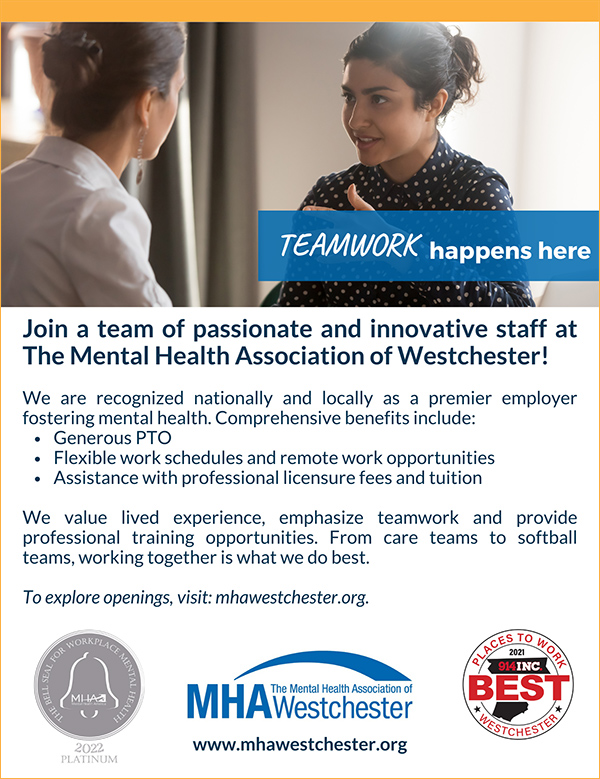The philosophy of The Mental Health Association of Westchester’s (MHA) housing and employment services and peer support is rooted in the principles of person-centered practice and the belief that individuals with behavioral health conditions – even those with histories of instability or little experience of living in the community – have the right to make choices about their living, working and social environments, and that making their own choices will speed recovery.

At MHA’s recent Power of Connection Gala, we highlighted the transformative power of personal connection in recovery – a connection we witness daily through our therapeutic services, care management, peer support, medical treatment, housing programs, and employment services. We proudly welcomed AnnMarie Wilhelm, MHA’s Peer Specialist Training Coordinator, and Marion Laby, a soon-to-be-graduate of our Peer Specialist Training program. AnnMarie and Marion shared their story of resilience and how Peer Support helped them both on their recovery journeys and offered a meaningful path forward in new careers.
Peer Support encompasses a range of activities and interactions between people who share similar experiences of being diagnosed with behavioral health conditions, substance use disorders, or both. This mutuality – often called “peerness” – between a peer specialist and a person in or seeking recovery promotes connection and inspires hope. Peer Support offers acceptance, understanding, and validation that has not always been experienced in other professional relationships. By sharing their own lived experience and practical guidance, Peer Specialists help people develop their goals, create self-empowerment strategies, and take concrete steps towards building fulfilling, self-determined lives for themselves.
MHA’s Peer Specialist training is rooted heavily in human rights and Peer Support values and principles. To become an effective, skilled peer specialist, these core values and principles are the foundation to ensure best practice and ethical approaches. Students completing the course acquire the knowledge, experience, and skills necessary to offer trauma-informed peer support and, upon graduation, are eligible to apply for the NY Peer Specialist Certification. Since its inception, our Peer Specialist training program has worked with close to 300 individuals, with many of these trainees later completing internships and finding employment as peer specialists.
“Peer support and the Peer Specialist Training program have given both of us hope, purpose, and a new life,” shared AnnMarie from the stage at MHA’s Gala. “I started my own journey in the Peer Specialist Training program in March 2017. I’ve always been in a helping profession. I worked for many years as a Certified Occupational Therapy Assistant in a big rehab facility. Unfortunately, escalating difficulties at work led to a partial outpatient program at a local hospital. That’s when I found out about Peer Specialists and the Peer Training program.”
At first, AnnMarie didn’t believe that she had what it takes to become a Peer Support Specialist. “I didn’t think my experience was the right experience. I had doubts that maybe my story wasn’t ‘enough’ or that I didn’t have enough ‘mental health cred,’” she remembers. “But my supervisor told me that didn’t matter. He said, ‘You know what it’s like to not have hope. And that’s what you have to give.’ It’s about giving people hope in their own journeys.”
“It’s true. MHA and AnnMarie have given me so much hope,” added Marion, who spoke alongside AnnMarie to a crowd of 230 guests. “I grew up in a dysfunctional family, with a mother with untreated mental illness. I suffered from abandonment issues, I lacked self-esteem, and I could easily be controlled by people I loved. I first sought out psychiatric help at the age of 32.”
“While medication did help, I unfortunately kept repeating the same cycles in my relationships and ultimately entered an abusive one,” recalls Marion. “After years of living in fear, experiencing obsessive thoughts, and an experience in an inpatient mental health institution in 2012, I was finally able to escape the relationship. At the age of 60, I started my life all over again. I secured a small room with a bed, microwave, and refrigerator for $500 a month. I didn’t even have a roll of toilet paper or a saltshaker.”
Previously, Marion had worked for many years managing a healthcare practice. By coincidence, she contacted a practitioner she had known in her former career, who was opening a new office in a new town. After being offered a job managing the new practice, Marion moved to a new town. After a period of time helping to grow the practice, Marion felt her confidence and self-esteem increasing. However, a change in leadership led to worsening treatment on the job, including verbal abuse. Marion was ultimately told she was no longer part of the practice’s future and was let go. “When I lost my job, I felt completely abandoned. I became paranoid. For months after, I barely ate, barely functioned. I was a bag of bones. In May of 2021, my now-husband brought me to White Plains Hospital to meet with the psychiatric team, and from there, I spent three weeks in a local inpatient program. I transitioned to outpatient and later, into a volunteer role. Last spring, my volunteer supervisor encouraged me to apply to MHA’s Peer Support Specialist Training program.”
Marion’s new journey was not without hurdles, however. “I’ve been challenged with tech stuff my whole life – it was part of the reason I was let go from my job,” she shared. My confidence was still so low.”
When Marion and AnnMarie first met last spring, it was immediately apparent to AnnMarie how much Marion wanted this new path in life despite her fears and low confidence. “If the tech aspect was the one thing hindering her or impacting her confidence, I knew I could give her the extra support,” recalls AnnMarie. “I knew that Marion just needed to find that hope. As we got to know each other, we realized we had very similar lived history, with major depression, anxiety, and even the career paths we had dreamed about when we were younger. So, I kept telling Marion, ‘I’ve been there, I understand. If I can do it, you can do it.’”
AnnMarie’s personal and professional trajectory as a Peer Support Specialist highlights the powerful opportunity for connection and hope through employment. “MHA’s Peer Training program gave me back my life. I was hired as a Peer Specialist after I completed my certification, and I was promoted to Coordinator of the Peer Training program this spring,” she shared. “I am so honored to give back, to show people that you can move past whatever is going on in your life. There is hope. There are people out there for you, people that will help you and guide you.”
Marion echoed AnnMarie’s sentiments. “Peer Specialist Training puts us back into society with the rest of the world,” she said, reflecting on the unique career path of a Peer Support Specialist. “This isn’t just some random job – it validates me. Because of what I’ve been through, I have so much hope, strength, and experience to share with others who live with mental health conditions. I want to give back and let people know they do not have to be alone – I understand, and I lived it, too!”
Ruthanne Becker, MA, is Senior Vice-President of Rehabilitation Services. AnnMarie Wilhelm, NYCPS, CRPA, is Coordinator of Peer Support Training. Marion Laby is an MHA Peer Specialist Training Program Graduate at the MHA of Westchester.
To learn more about our Peer Specialist Training and upcoming training cycles, please visit mhawestchester.org.





